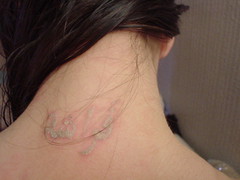
This is the back of Ruth's neck, on which she has just had the Arabic word farashah tattooed in white. Studying the inscribed body has traditionally been the preserve of anthropologists - their focus has been on how body art acts as a marker of identity in terms of gender, age, and status. But tattoos and other forms of body art have become important in contemporary culture. We are interested in the visible surface of the body as the boundary between the individual and society. The body becomes a text, a surface on which we write. The text is with us at all times. Writing on the body was provokingly explored in Greenaway's excellent film The Pillow Book. And here, out of interest is a link to his latest project - one of those sites you need to explore!
A post with a picture for TT. Who says I'm not responsive?
ReplyDeleteAnd then, of course, there's Jeanette Winterson's 'written on the body', see her blog at:
ReplyDeletehttp://www.jeanettewinterson.com/about.asp
(are you impressed I have learned how to send a comment, Guy???)
Jackie
I'm really impressed - that's great! And thanks for the reference. You'll be leaving comments on the multimodality blog next!
ReplyDeleteOoooh. That tattoo looks painful. Will it be beautiful in the end?
ReplyDeleteThanks Guy. For the picture you will be rewarded with a mention in my post tonight.
ReplyDeleteTrois Têtes, the best French sounding blog this side of Watford Gap